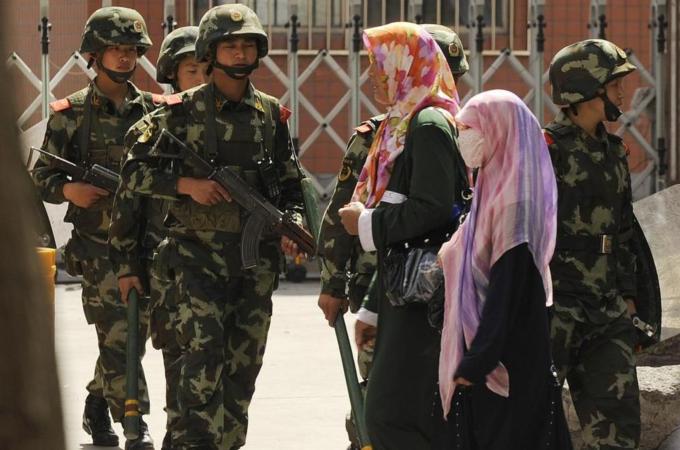The Xinjiang region has been the site of a mass detention program where an estimated 1.5 million Uyghurs have been or are being held in a series of internment camps. While authorities have claimed that these camps are simply “vocational training” facilities, there has been evidence of forced labor, political indoctrination, abuse, and deaths inside the camps. Reuters’ Michael Martina reports on senior Xinjiang officials’ recent claims that most people sent to the mass detention facilities have “returned to society”:
Xinjiang vice chairman Alken Tuniaz, asked at a briefing in Beijing for an account of how many people had been put in the facilities, said the number was “dynamic”, and that most had “successfully achieved employment”.
“Currently, most people who have received training have already returned to society, returned home,” Tuniaz said.
A transcript of the briefing emailed to reporters had been edited to read “most have already graduated”, using the word for students who finish a course or graduate from high school.
[…] “Individual countries and news media have ulterior motives, have inverted right and wrong, and slandered and smeared (China)” over the centers, he said. [Source]
Xinjiang governor Shohrat Zakir was also at the briefing, and claimed that “after these past one to two years of effort, most of the people at the training centres who return to society–you could say more than 90 percent–have found work that they like and find suitable.” Last week, a white paper published by China’s State Council Information Office made the historical claim that Xinjiang is an “inseparable” part of China (based on “half truths” and information that is “frankly not true,” according to expert on Chinese ethnic minorities James Leibold).
At The Wall Street Jounal, Chun Han Wong reports on skepticism of the officials’ claims from academics and exiled Uyghurs who are closely following the situation in Xinjiang:
The officials’ vague statements drew skepticism from academics and Uighur activists living abroad. They said many detainees may live under close supervision and other restrictions after release, or could be forced to work in tightly policed factories in Xinjiang or elsewhere in China.
An accurate tally of released detainees is hard to calculate because many are living in “a situation where the threat of detention still looms, and they’ve been intimidated into cutting off contact with the outside world,” said David Brophy, a historian at the University of Sydney who studies Xinjiang issues. “We’re aware of some people being released, but we’re also aware of people being newly detained.”
Mr. Brophy also questioned the claim that most former detainees have found jobs. “How much of this employment involves forced relocation to elsewhere in China? How much of it is taking place in education camps that have now been repurposed as heavily surveilled factories?” he said.
Halmurat Harri Uyghur, a Uighur activist who lives in Finland, said many people who were detained in the Xinjiang camps were intellectuals, former civil servants and others who already had jobs. “If 90% of them found a good job, I would like to ask, what’s their occupation before they were detained?” said Mr. Uyghur, whose parents had been detained and later released. “How many of them are retired civil servants like my parents?” […] [Source]
The New York Times’ Chris Buckley reports further on experts’ skepticism:
“Uighurs abroad continue to be unable to reach their relatives in the region. No phone calls, no internet communications,” said Tahir Imin, a Uighur activist based in Washington.
“If the Chinese government is honest and confident in what it’s saying to the media, it should allow people to communicate freely and go out of the country freely and allow independent media to visit and investigate freely,” he said.
[…] James Leibold, an associate professor of politics at La Trobe University in Australia who has studied the wave of mass detentions in Xinjiang, said that factories are often linked to the camps, and that inmates assigned to work there live under heavy guard and monitoring.
“I find it highly unlikely, and frankly inconceivable, that the Chinese Communist Party would build this massive network of internment camps and then simply mothball them a couple of years later,” Professor Leibold said by email. “Rather, the purposes of the camps were perhaps always meant to evolve over time, shifting from education to production, while their coercive, nonvoluntary and extrajudicial nature remains the same.” [Source]
Read more on the internment camps, and on the human rights situation in Xinjiang, via CDT.








